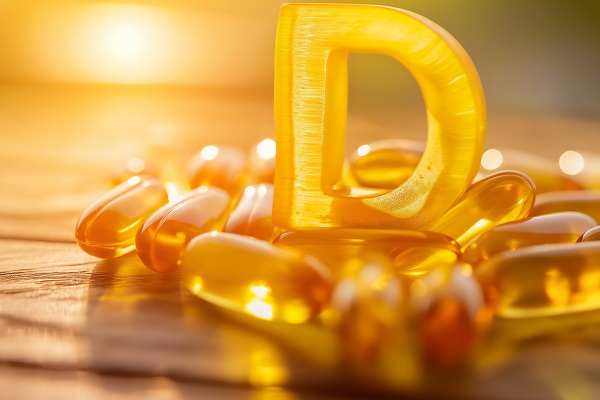Everyone has probably already heard of this remarkable vitamin that affects every organ of the body. It is called a prohormone because of its structure and functions. Vitamin D has its own receptors (VDR) in the human body, which are responsible for the expression of thousands of genes. Its role in the functioning of the immune system is comprehensive.
Vitamin D – sources and requirements
As the only nutrient compound, it is produced by the skin when exposed to sunlight. It is produced in optimal amounts between 10 am and 1 pm during the summer for about 20 minutes. For this reason, everyone needs to supplement it during autumn and winter. It is ideal if the dose is adjusted according to the 25(OH)D result in the blood. However, without knowing the level, the standard is 2000IU per day in adults. Foods have doses that are too low to meet such a high need in the body. It should be emphasised that the full activity of vitamin D additionally requires the presence of several cofactors in the body, such as:
- magnesium (which increases its absorption), zinc, selenium, boron
- vitamins A, K, B2 and C
- omega-3 fatty acids.

The effect of vitamin D on immunity
The immune system consists of an innate part, such as mucosal immunity, and an acquired part, which is learned by the body from experience and exposure to pathogens. The trick is to maintain a balance, as an over-reactive immune system can also cause problems. Calcitriol maintains homeostasis in the body in this aspect. It thus provides valuable protection against the development of autoimmune diseases. The differentiation and multiplication of immune cells is made possible by this compound. Vitamin D receptors are found in, among others, monocytes, macrophages, T and B lymphocytes. Appropriate activation of these cells under the influence of pathogens allows them to properly cope with the infection. Cell-to-cell communication and the sending of signals also supports a sufficient supply of this vitamin1.
This vitamin has the ability to produce special proteins:
- cathelicidin with bactericidal and virucidal properties
- β-defensin 2.
Calcitriol inhibits the production of pro-inflammatory cytokines and increases the synthesis of anti-inflammatory ones. An adequate amount of vitamin D in the body significantly reduces the symptoms of COVID-19 infection, among others, as well as complications and deaths from this cause (as it helps, among other things, to avoid the so-called cytokine storm)2.
Vitamin D deficiency and immunity
Not surprisingly, a deficiency of this compound increases susceptibility to bacterial and viral infections3. A meta-analysis by Martineau A. et al. showed that vitamin D supplementation protects against the experience of acute respiratory tract infection. The greatest benefits of supplementation are achieved by individuals with significant cholecalciferol deficits4. In fact, mortality from any cause is reduced by optimal concentrations of 25(OH)D in the body. It is estimated that this will ensure the achievement of 50 ng/ml of this compound in the blood.

How to use vitamin D
The desirable form of supplementation is vitamin D3 (and not the less well absorbed D2), preferably dissolved in oil, because of the body’s ability to assimilate this compound only in the presence of fat. Taking cholecalciferol with a meal with fat present will also be helpful, preferably with breakfast or lunch. The dose should be determined individually by the doctor on the basis of the test results. The standard recommendation for adults is a dose of 2,000IU, and twice as much for the elderly and obese. The upper and safe limit is a dose of 10,000IU of cholecalciferol per day5.
References:
1Gholamreza Daryabor, Nasser Gholijani, Fatemeh Rezaei Kahmini, A review of the critical role of vitamin D axis on the immune system, Experimental and Molecular Pathology, Volumes 132–133, 2023
2Bikle DD. Vitamin D Regulation of Immune Function. Curr Osteoporos Rep. 2022 Jun;20(3):186-193.
3Wimalawansa SJ. Infections and Autoimmunity-The Immune System and Vitamin D: A Systematic Review. Nutrients. 2023 Sep 2;15(17):3842.
4Martineau AR, Jolliffe DA, Hooper i wsp.:. Vitamin D supplementation to prevent acute respiratory tract infections: systematic review and meta-analysis of individual participant data. BMJ. 2017 Feb 15;356:i6583.
5Płudowski P, Kos-Kudła B, Walczak M. i wsp.: Guidelines for Preventing and Treating Vitamin D Deficiency: A 2023 Update in Poland. Nutrients. 2023 Jan 30;15(3):695.
6Aranow C. Vitamin D and the immune system. J Investig Med. 2011 Aug;59(6):881-6.

